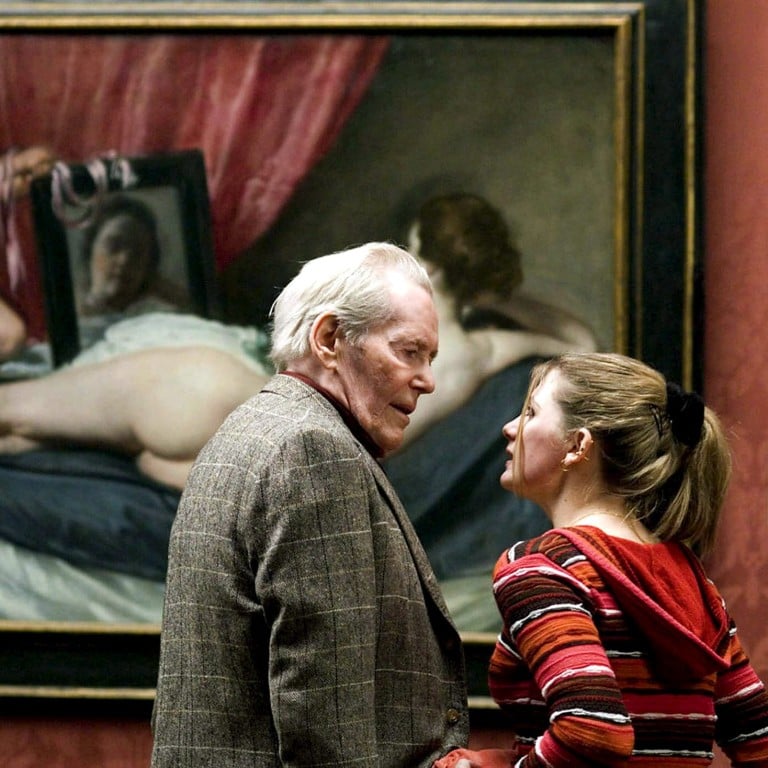
Book review: looking for Peter O'Toole in the swirl of dust left by a hellraising life
A towering figure on stage and screen, O'Toole lived hard, with nary a backward glance or a moment's introspection, says author of new biography


In the late 1940s, a working-class Catholic schoolboy sat down to write a poem that read like a contract with his future self. "I will not be a common man, because it is my right to be an uncommon man," he vowed. "I will stir the smooth sands of monotony."
Over the course of a six-decade acting career, Peter O'Toole rarely passed up an opportunity to lord it over his rivals; to clamour for the world's attention; to upset the applecart of conformity. His life amounted to a series of flamboyant gestures. He kicked up so much dust he risked being lost in the swirl.
Robert Sellers' barnstorming biography runs us with gusto through the O'Toole picaresque, which is another way of saying that it's a portrait of the swirl. The actor talked big and covered his tracks to such an extent that even his closest friends and relations could not quite figure him out. Visiting him on the set of a film, his sister fell into conversation with O'Toole's fellow players, asking: "At the end of this picture, will you tell me who my brother is?"
O'Toole boasted that he was a proud Irishman, born in Connemara. His birth certificate states that he was born in Leeds. As a small boy he was already intent on raising a ruckus, outraging the nuns by adding dangling genitalia to his drawing of a horse. Fresh from national service, he appears to have stumbled backwards into the Royal Academy of Dramatic Art and only landed what would prove his breakthrough role, in David Lean's , after Marlon Brando and Albert Finney turned it down.

Judged at face value, his early career plays out as a series of happy accidents, although Sellers suggests that this was only half the story. Colleagues also testify to O'Toole's innate understanding of stagecraft, his photographic memory, his exacting professionalism. He took the work seriously, while treating his life as a joke.
Alcohol, of course, was his most devoted co-star and it provides the fuel for the book's rambunctious interludes. Sellers shows O'Toole on a bender with Richard Burton, stumbling drunk on stage alongside Richard Harris and dragging Michael Caine through a lost London weekend. The two men have no memory of where the last 48 hours have gone. Caine cannot think why they have been slapped with a lifetime ban from a nearby restaurant. "Never ask what you did," O'Toole whispers to him. "It is better not to know."
If O'Toole's first act gives us the cacophonous party, it follows that the second will unfold as a painful hangover. His marriage breaks down and his career hits the buffers and he has to swear off the booze after an operation to remove his pancreas. By the mid-1970s, it is clear that his rich, declamatory style has been overtaken by the mumbling, Method school adopted by US actors such as Dustin Hoffman and Al Pacino ("gibberish spouting", O'Toole called it). His matinee-idol looks are showing signs of wear and tear.
He returns to the stage in a disastrous production of at the Old Vic. He orders that the set be doused in so much fake blood that the actors slip and fall, and the stagehands hurry out from the wings to mop up the mess. The audience is in fits but the star remains unrepentant. "No blood, no show!" he bellows from his dressing room.
If life was like drama, Sellers' tale could probably end here, with the sound of the half-crazed old lion roaring impotently backstage, his health in tatters, his glory days all behind him. As it was, O'Toole hauled himself through a further three decades. He outlived the bulk of his drinking companions and notched up the last of eight Oscar nominations for his fractious, grudging contribution to the 2006 film .
Crucially, Sellers depicts him as a man who never looked back, barely pausing to consider the implications of the tumult he caused. Introspection seems to have been something he felt he could not afford: it would crush him and kill him; he preferred to keep moving. He drank to enhance every moment and then rub it clean.
When O'Toole died, late in 2013, he was hailed as the last of the hellraisers who galvanised fusty, postwar British cinema; an actor who set out to whip his own life into an ongoing performance. He confused monologues for conversation and either dazzled or exasperated anyone who drew near.
Midway through the book, Sellers throws in a telling aside from the making of : O'Toole hoisting co-star Petula Clark on his shoulders and both of them singing at the top of their lungs as they stagger home through the darkened London suburbs. Windows are thrown up; neighbours angrily call for the pair to shut up. "Don't you realise who we are?" O'Toole yells back. "You should be paying for this!"
The Guardian
